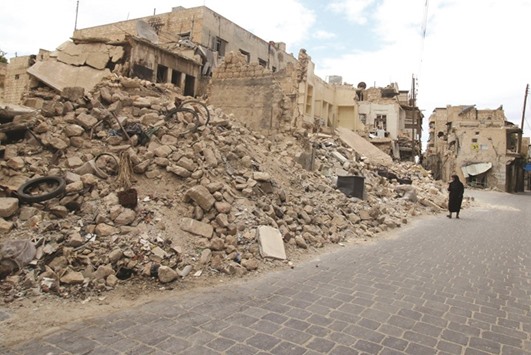A 48-hour ceasefire took hold yesterday in Syria’s battered second city of Aleppo after President Bashar al-Assad’s regime and rebel forces gave in to mounting diplomatic pressure.
Relieved residents returned to the streets after two weeks of heavy fighting in the divided metropolis, a key battleground in Syria’s five-year civil war.
The Syrian army said late on Wednesday that it had agreed to calls from Russia and the US for a two-day truce in Aleppo that would begin from 1am yesterday.
The agreement followed an intense diplomatic push by Moscow and Washington - the co-sponsors of a February 27 ceasefire agreement that had begun to fall apart - to salvage peace efforts.
Renewed fighting in recent days, especially in and around Aleppo, had threatened the full collapse of the ceasefire, a landmark in attempts to finally resolve a conflict that has left more than 270,000 dead.
More than 280 civilians were reported killed since April 22 in the clashes in Aleppo, with regime air strikes pounding the opposition-held east while rebels fired a barrage of rockets into the government-controlled west. An AFP correspondent in Aleppo said yesterday there had been no signs of fresh air raids since the ceasefire took effect.
As residents emerged, shopkeepers reopened their doors while fruit and vegetable markets - one of which was struck in an April 24 raid that left 12 dead - were again up and running.
The Syrian Observatory for Human Rights, a monitoring group, confirmed there had been no bombing in the city, though it said a civilian had died in a western district from rebel shelling that came minutes after the ceasefire took effect.
After a whirlwind of talks involving diplomats from top world powers and the UN, US Secretary of State John Kerry announced the truce had taken effect and that violence had already fallen off.
“We’ve seen an overall decrease in violence in those areas even though there are some reports of continued fighting in some locations,” Kerry said.
Kerry said US officials in Geneva were co-ordinating with their Russian colleagues on “enhanced monitoring efforts for this renewed cessation”. The Russian defence ministry said its ceasefire monitors had agreed with their US counterparts to oversee this truce until midnight on May 6.
In Aleppo, the head of the local branch of the powerful Jaish al-Islam rebel force, Ahmad Sanada, said the group would respect the ceasefire.
“We are in favour of any initiative that relieves the suffering of civilians and avoids bloodshed and we will respect” the ceasefire, he told AFP.
Diplomats are hoping a nationwide ceasefire can underpin efforts to resolve Syria’s war, which evolved from a crackdown on anti-government protests into a devastating multi-front conflict.
UN-backed peace talks in Geneva, which mediators hope can resume later this month, have so far made little headway, with the regime rejecting the opposition’s demand that Assad step aside as part of a political transition.
The conflict led in part to the emergence of the militant Islamic State group, which has seized control of large areas of Syria and neighbouring Iraq.
Twin bombings in central Syria yesterday killed at least 12 civilians including two women, the Observatory and state television said.
The suicide attack and car bombing in a square in Mukharram al-Fawqani in Homs province came amid recent fighting in the area between IS fighters and regime troops.
The area, controlled by the regime, is located between the cities of Homs and Palmyra, which the Syrian army recaptured from militants in late March.
The blasts came just days after IS seized the nearby Shaer gas field, one of the biggest in Homs, in an attack that killed at least 16 regime troops.
There was no immediate claim of responsibility for yesterday’s attacks but suicide and car bombings are a favourite tactic of IS militants.

A woman walks yesterday near the rubble of collapsed buildings in the rebel-held area of Old Aleppo.
